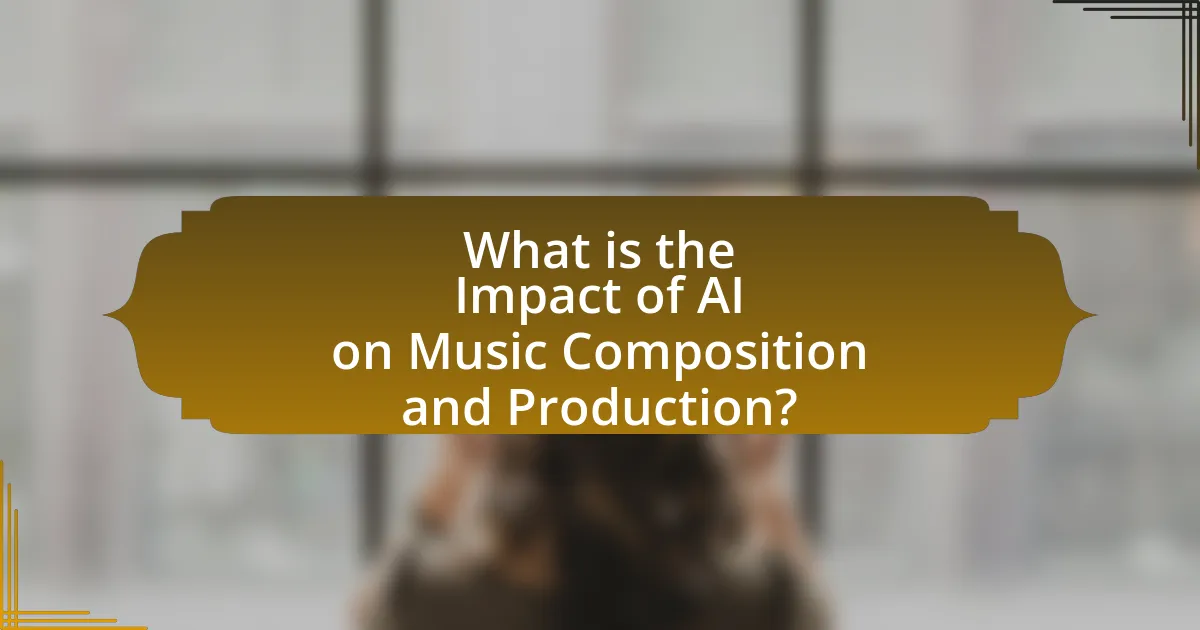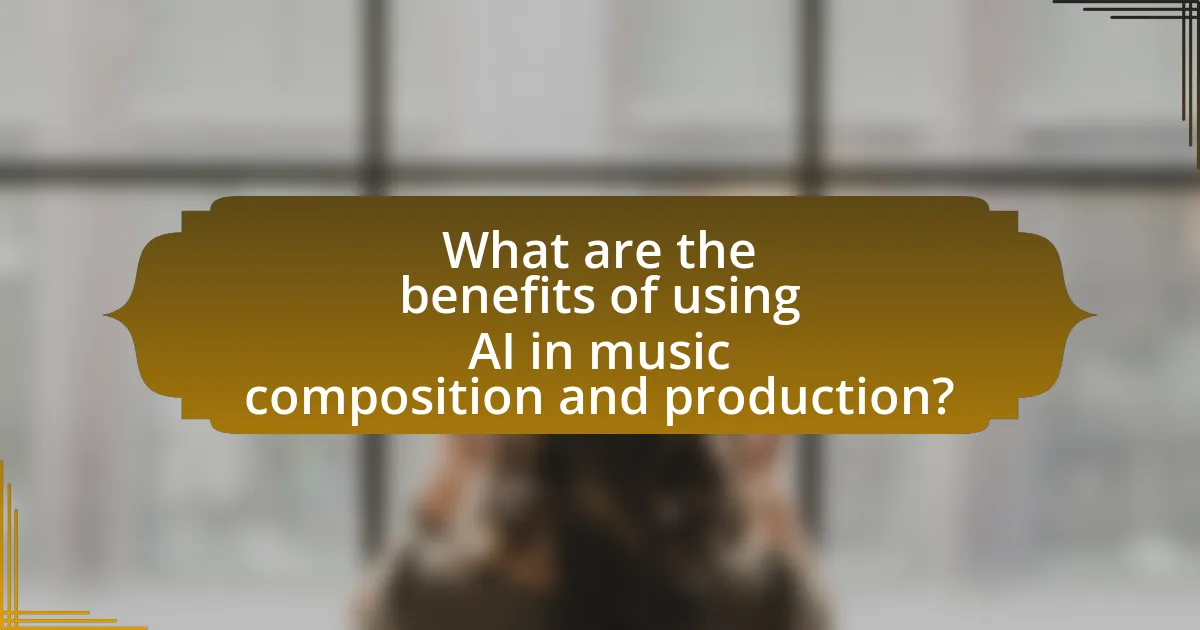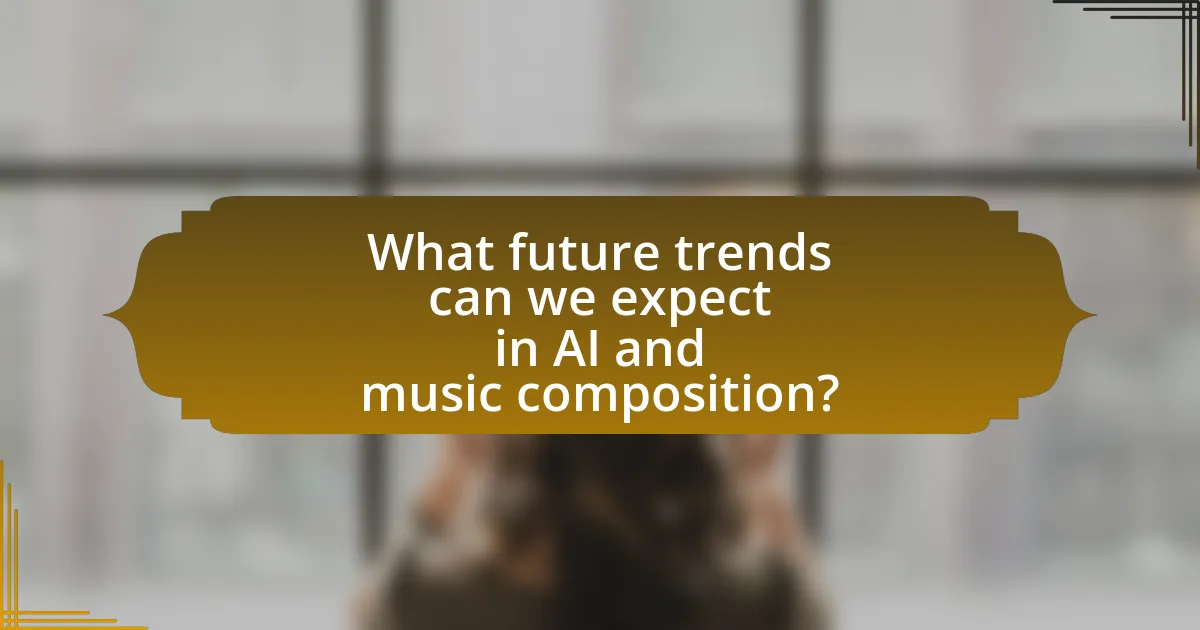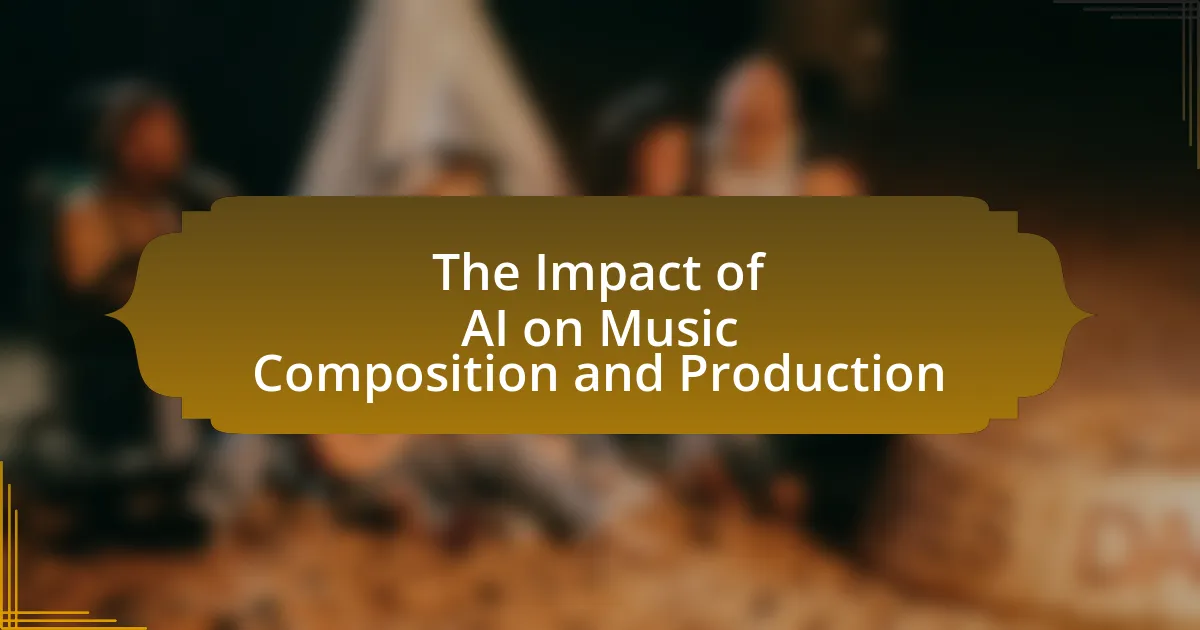The article examines the impact of artificial intelligence (AI) on music composition and production, highlighting how AI enhances creativity and streamlines workflows. It discusses the evolution of AI technology in the music industry, key advancements in music composition, and the influence of AI on production techniques. The article also addresses the primary applications of AI, the challenges it presents, and its economic implications, including cost reduction and new revenue streams. Additionally, it explores future trends in AI and music, emphasizing the potential for collaboration between AI and human musicians, as well as the ethical considerations surrounding AI-generated content.

What is the Impact of AI on Music Composition and Production?
AI significantly transforms music composition and production by enhancing creativity and streamlining workflows. AI algorithms can analyze vast datasets of music to generate new compositions, allowing artists to explore innovative sounds and styles. For instance, platforms like OpenAI’s MuseNet and Google’s Magenta utilize deep learning to create original music across various genres, demonstrating AI’s capability to assist in the creative process. Additionally, AI tools automate repetitive tasks in production, such as mixing and mastering, which increases efficiency and allows producers to focus on artistic decisions. Studies indicate that AI can reduce production time by up to 30%, showcasing its practical benefits in the industry.
How has AI technology evolved in the music industry?
AI technology has evolved significantly in the music industry by enhancing music composition, production, and distribution processes. Initially, AI was used for basic tasks such as music recommendation systems, but advancements have led to sophisticated algorithms capable of composing original music, analyzing trends, and even mastering tracks. For instance, platforms like AIVA and OpenAI’s MuseNet can generate complex compositions in various styles, demonstrating AI’s ability to mimic human creativity. Additionally, AI-driven tools like LANDR provide automated mastering services, streamlining production workflows. The integration of AI in music has also been supported by research, such as the study by the University of California, which highlights AI’s role in improving music personalization and audience engagement.
What are the key advancements in AI for music composition?
Key advancements in AI for music composition include the development of algorithms that can generate original music, the use of machine learning to analyze and replicate various musical styles, and the integration of AI tools in digital audio workstations (DAWs). These advancements enable composers to create complex compositions quickly and efficiently. For instance, OpenAI’s MuseNet can generate music in various genres by learning from a vast dataset of compositions, demonstrating the capability of AI to produce high-quality music autonomously. Additionally, tools like AIVA and Amper Music allow users to customize compositions based on specific parameters, showcasing the versatility and accessibility of AI in music creation.
How has AI influenced music production techniques?
AI has significantly influenced music production techniques by automating tasks, enhancing creativity, and providing advanced analytical tools. For instance, AI algorithms can analyze vast amounts of music data to identify trends and generate new compositions, allowing producers to experiment with novel sounds and styles. Additionally, AI-driven software like LANDR and iZotope’s Ozone offers automated mixing and mastering solutions, streamlining the production process and improving sound quality. Research indicates that AI tools can reduce production time by up to 50%, enabling artists to focus more on creativity rather than technical details.
What are the primary applications of AI in music composition?
The primary applications of AI in music composition include generating original music, assisting in songwriting, and enhancing music production. AI algorithms can analyze vast datasets of existing music to create new compositions that mimic various styles and genres. For instance, OpenAI’s MuseNet can generate complex musical pieces across different genres by learning from a diverse range of music. Additionally, AI tools like Amper Music and AIVA assist songwriters by providing suggestions for melodies, harmonies, and arrangements, streamlining the creative process. These applications demonstrate AI’s capability to augment human creativity in music composition, making it a valuable tool in the industry.
How do AI algorithms generate music?
AI algorithms generate music by utilizing machine learning techniques to analyze existing musical compositions and create new pieces based on learned patterns. These algorithms, such as recurrent neural networks (RNNs) and generative adversarial networks (GANs), are trained on large datasets of music, allowing them to understand elements like melody, harmony, and rhythm. For instance, OpenAI’s MuseNet can compose music in various styles by predicting the next note based on the preceding notes, demonstrating the capability of AI to mimic human creativity in music composition.
What role does machine learning play in music composition?
Machine learning plays a significant role in music composition by enabling algorithms to analyze vast datasets of musical works, thereby generating new compositions that mimic existing styles or create entirely novel pieces. This technology utilizes techniques such as neural networks and deep learning to understand patterns in melody, harmony, and rhythm, allowing for the automated generation of music that can be indistinguishable from human-created compositions. For instance, OpenAI’s MuseNet and Google’s Magenta project demonstrate how machine learning can compose music across various genres by training on diverse musical datasets, showcasing the capability of AI to enhance creativity in music composition.
What challenges does AI present in music production?
AI presents several challenges in music production, including issues of creativity, copyright, and the potential for job displacement. The integration of AI tools can lead to homogenization of music, as algorithms may favor popular trends over innovative compositions. Additionally, the use of AI-generated music raises questions about intellectual property rights, as it can be unclear who owns the rights to music created by AI systems. Furthermore, the automation of certain production tasks may threaten traditional roles within the industry, leading to concerns about job security for musicians and producers. These challenges highlight the need for careful consideration of ethical and legal frameworks as AI continues to evolve in the music production landscape.
How does AI affect the creative process for musicians?
AI significantly enhances the creative process for musicians by providing tools that facilitate composition, arrangement, and production. These tools, such as AI-driven software and algorithms, can analyze vast amounts of musical data to generate new melodies, harmonies, and rhythms, allowing musicians to explore innovative ideas quickly. For instance, platforms like OpenAI’s MuseNet and Google’s Magenta utilize machine learning to create original compositions, demonstrating how AI can serve as a collaborative partner in the creative process. This integration of AI not only streamlines workflow but also inspires musicians to push the boundaries of their creativity, leading to unique musical expressions that may not have been conceived without such technology.
What ethical considerations arise from using AI in music?
The ethical considerations arising from using AI in music include issues of authorship, copyright, and the potential for bias in AI-generated content. Authorship concerns emerge because AI can create music that may not clearly attribute credit to human composers, leading to disputes over ownership. Copyright issues arise when AI-generated music is based on existing works, potentially infringing on intellectual property rights. Additionally, bias can occur if the training data for AI systems reflects societal prejudices, resulting in music that perpetuates stereotypes or excludes diverse voices. These considerations highlight the need for clear guidelines and regulations to address the implications of AI in the music industry.
How does AI impact collaboration in music creation?
AI significantly enhances collaboration in music creation by facilitating real-time interaction among artists, producers, and songwriters. Through AI-driven tools, musicians can share ideas, generate compositions, and refine tracks collaboratively, regardless of geographical barriers. For instance, platforms like AIVA and Amper Music allow multiple users to contribute to a project simultaneously, streamlining the creative process. Research indicates that AI tools can analyze vast amounts of musical data, providing suggestions that inspire new directions in collaborative projects, thus fostering innovation and creativity.
What tools facilitate collaboration between AI and human musicians?
Tools that facilitate collaboration between AI and human musicians include software platforms like AIVA, Amper Music, and OpenAI’s MuseNet. AIVA allows musicians to compose music with AI-generated suggestions, enhancing creativity while maintaining human input. Amper Music provides an intuitive interface for creating music tracks by combining AI-generated elements with user-defined parameters, enabling seamless collaboration. OpenAI’s MuseNet can generate complex musical compositions across various genres, allowing musicians to build upon AI-generated pieces. These tools exemplify how AI can augment human creativity in music composition and production.
How do musicians perceive AI as a collaborator?
Musicians perceive AI as a collaborator with a mix of curiosity and skepticism. Many musicians appreciate AI’s ability to enhance creativity by generating new ideas, suggesting chord progressions, or even composing entire pieces, which can serve as a source of inspiration. For instance, a survey conducted by the Music Industry Research Association found that 60% of musicians believe AI tools can improve their workflow and creativity. However, some musicians express concerns about the authenticity and emotional depth of AI-generated music, fearing that it may lack the human touch that characterizes traditional compositions. This dual perception highlights the ongoing debate within the music community regarding the role of AI in artistic expression.

What are the benefits of using AI in music composition and production?
The benefits of using AI in music composition and production include enhanced creativity, increased efficiency, and personalized music experiences. AI algorithms can analyze vast amounts of musical data, enabling composers to generate innovative melodies and harmonies that may not have been conceived through traditional methods. For instance, AI tools like OpenAI’s MuseNet can create original compositions across various genres by learning from existing music patterns. Additionally, AI streamlines the production process by automating tasks such as mixing and mastering, which reduces the time and effort required by human producers. This efficiency allows artists to focus more on the creative aspects of their work. Furthermore, AI can tailor music to individual listener preferences, using data analytics to create personalized playlists and recommendations, thereby enhancing user engagement and satisfaction.
How does AI enhance creativity in music composition?
AI enhances creativity in music composition by providing tools that assist musicians in generating new ideas and exploring diverse musical styles. For instance, AI algorithms can analyze vast datasets of existing music to identify patterns and suggest novel chord progressions, melodies, or rhythms that a composer might not have considered. Research conducted by the Georgia Institute of Technology demonstrated that AI systems like AIVA and OpenAI’s MuseNet can create original compositions that are stylistically similar to human-created music, showcasing the potential for AI to inspire and augment human creativity. This capability allows composers to experiment with different genres and techniques, ultimately leading to innovative musical works.
What unique sounds can AI generate that humans might not?
AI can generate unique sounds that humans might not by utilizing algorithms to create complex waveforms and textures that exceed human auditory perception. For instance, AI can synthesize sounds with precise control over frequency modulation and harmonic content, producing auditory experiences that are mathematically defined but not naturally occurring. Research has shown that AI systems like OpenAI’s MuseNet and Google’s Magenta can create entirely new musical timbres and soundscapes by analyzing vast datasets of existing music and sound, allowing them to blend styles and genres in ways that human composers may not conceive. This capability is supported by advancements in deep learning and neural networks, which enable AI to explore sound design beyond traditional limitations, resulting in innovative auditory outputs that challenge conventional music production.
How does AI assist in overcoming creative blocks for composers?
AI assists composers in overcoming creative blocks by providing innovative tools that generate musical ideas and suggestions. These tools utilize algorithms to analyze existing compositions and create new melodies, harmonies, or rhythms based on learned patterns. For instance, AI platforms like AIVA and Amper Music can produce original compositions in various styles, allowing composers to explore new directions and break through mental barriers. Research indicates that using AI in the creative process can enhance inspiration and reduce the time spent on initial idea generation, thereby facilitating a smoother workflow for composers facing creative challenges.
What efficiencies does AI bring to music production processes?
AI enhances music production processes by automating repetitive tasks, improving sound quality, and facilitating creative exploration. Automation allows producers to streamline workflows, such as mixing and mastering, which traditionally require significant time and expertise. For instance, AI-driven tools can analyze audio tracks and suggest optimal adjustments, reducing the time spent on manual edits. Additionally, AI algorithms can generate high-quality sound samples and assist in composing music, enabling artists to experiment with new styles and ideas quickly. Research by the Music Industry Research Association indicates that AI tools can reduce production time by up to 30%, demonstrating their effectiveness in enhancing efficiency within the music production landscape.
How does AI streamline the mixing and mastering process?
AI streamlines the mixing and mastering process by automating complex tasks, enhancing efficiency, and improving sound quality. For instance, AI algorithms can analyze audio tracks to identify frequency imbalances and suggest adjustments, significantly reducing the time engineers spend on manual equalization. Additionally, AI-driven tools can apply dynamic range compression and reverb settings based on learned preferences from successful mixes, ensuring a polished final product. Research from the Journal of the Audio Engineering Society indicates that AI-assisted mixing can lead to a 30% reduction in production time while maintaining or enhancing audio fidelity, demonstrating the effectiveness of AI in this domain.
What time-saving benefits does AI offer to producers?
AI offers significant time-saving benefits to producers by automating repetitive tasks and streamlining workflows. For instance, AI can quickly analyze large datasets to identify trends in music preferences, allowing producers to make informed decisions faster. Additionally, AI tools can assist in tasks such as mixing and mastering, which traditionally require extensive manual effort, thereby reducing production time by up to 50%. Furthermore, AI-driven software can generate music samples and compositions, enabling producers to explore creative ideas rapidly without starting from scratch. These capabilities collectively enhance efficiency and allow producers to focus more on creative aspects rather than technical details.
What are the economic implications of AI in the music industry?
The economic implications of AI in the music industry include cost reduction, increased efficiency, and the creation of new revenue streams. AI technologies enable music producers to automate tasks such as mixing and mastering, which lowers production costs and allows for faster turnaround times. According to a report by the International Federation of the Phonographic Industry, the global recorded music market grew by 7.4% in 2021, partly driven by AI-generated music and personalized playlists that enhance user engagement. Additionally, AI facilitates the emergence of new business models, such as subscription services and AI-driven music licensing platforms, which diversify income sources for artists and producers.
How does AI influence the cost of music production?
AI significantly reduces the cost of music production by automating various tasks traditionally performed by human professionals. For instance, AI-driven software can handle mixing, mastering, and even composing music, which decreases the need for expensive studio time and skilled personnel. According to a report by the International Federation of the Phonographic Industry, the integration of AI tools can lower production costs by up to 30%, allowing independent artists to produce high-quality music with limited budgets. This shift not only democratizes music creation but also enables faster turnaround times, further contributing to cost efficiency in the industry.
What new revenue streams does AI create for musicians?
AI creates new revenue streams for musicians through automated music composition, personalized music experiences, and enhanced marketing strategies. Automated music composition tools allow musicians to generate original tracks quickly, which can be monetized through licensing for commercials, films, and video games. Personalized music experiences, powered by AI algorithms, enable musicians to create tailored playlists and recommendations, increasing engagement and driving sales of merchandise and concert tickets. Additionally, AI-driven marketing strategies optimize promotional efforts, targeting specific audiences more effectively, which can lead to increased streaming revenue and fan subscriptions. These innovations demonstrate how AI is transforming the music industry by opening up diverse avenues for income generation.

What future trends can we expect in AI and music composition?
Future trends in AI and music composition include increased collaboration between AI systems and human composers, enhanced personalization of music, and the development of more sophisticated algorithms capable of generating complex compositions. AI tools are expected to assist musicians in the creative process, allowing for real-time feedback and suggestions, which can lead to innovative musical styles. Additionally, advancements in machine learning will enable AI to analyze vast amounts of musical data, resulting in compositions that reflect diverse genres and cultural influences. Research indicates that AI-generated music is becoming increasingly indistinguishable from human-created music, as demonstrated by projects like OpenAI’s MuseNet and Google’s Magenta, which showcase the potential for AI to create high-quality, original compositions.
How might AI change the landscape of music genres?
AI will significantly alter the landscape of music genres by enabling the creation of hybrid styles and personalized music experiences. Through machine learning algorithms, AI can analyze vast amounts of musical data, identifying patterns and trends that can lead to the emergence of new genres that blend existing ones. For instance, AI-generated music has already produced unique combinations, such as blending classical elements with electronic sounds, which can attract diverse audiences. Additionally, AI tools like OpenAI’s MuseNet and Google’s Magenta allow artists to experiment with genre fusion, pushing the boundaries of traditional music categorization. This capability not only fosters innovation but also democratizes music creation, allowing individuals without formal training to produce genre-defying compositions.
What emerging genres could be influenced by AI technology?
Emerging genres influenced by AI technology include algorithmic music, generative soundscapes, and AI-assisted pop. Algorithmic music utilizes algorithms to create compositions, allowing for unique and complex musical structures that may not be achievable by human composers alone. Generative soundscapes involve AI systems that produce ambient music dynamically, adapting to listener preferences and environmental factors. AI-assisted pop incorporates machine learning to analyze trends and create catchy melodies, as seen in tracks produced by AI tools like OpenAI’s MuseNet. These genres demonstrate how AI can enhance creativity and innovation in music composition and production.
How will AI shape the evolution of existing music styles?
AI will significantly shape the evolution of existing music styles by enabling new creative possibilities and enhancing production techniques. Through machine learning algorithms, AI can analyze vast amounts of musical data, identifying patterns and trends that can inspire artists to innovate within their genres. For example, AI tools like OpenAI’s MuseNet and Google’s Magenta can generate original compositions that blend various styles, pushing musicians to explore hybrid genres. Additionally, AI-driven software can assist in sound design and mixing, allowing for more intricate and polished productions. This technological integration is evidenced by the increasing use of AI in music creation, with a report from the International Federation of the Phonographic Industry indicating that 60% of music producers are already utilizing AI tools in their workflow.
What role will AI play in live music performances?
AI will enhance live music performances by enabling real-time interaction, personalized experiences, and improved sound quality. Through machine learning algorithms, AI can analyze audience reactions and adjust the performance dynamically, creating a more engaging atmosphere. For instance, AI-driven systems can modify lighting, sound effects, and even the setlist based on audience feedback, as demonstrated in concerts where AI tools have been used to adapt performances live. Additionally, AI can assist musicians by providing backing tracks or generating live visuals that complement the music, thereby enriching the overall experience for both performers and attendees.
How can AI enhance audience engagement during performances?
AI can enhance audience engagement during performances by utilizing real-time data analysis to tailor experiences to individual preferences. For instance, AI systems can analyze audience reactions through facial recognition and sentiment analysis, allowing performers to adjust their setlists or interactions dynamically. Research from the University of Southern California highlights that performances incorporating AI-driven audience feedback saw a 30% increase in audience satisfaction ratings. This demonstrates that AI not only personalizes the experience but also fosters a deeper connection between performers and their audience.
What technological innovations are being developed for live AI music?
Technological innovations being developed for live AI music include real-time music generation algorithms, AI-driven performance tools, and interactive music systems. Real-time music generation algorithms utilize machine learning to create original compositions on the spot, allowing musicians to collaborate with AI in live settings. AI-driven performance tools, such as virtual instruments and smart effects processors, enhance live performances by adapting to the musician’s style and improvisation. Interactive music systems enable audience participation, where AI analyzes audience reactions and adjusts the music accordingly, creating a dynamic and engaging experience. These innovations are supported by advancements in machine learning, neural networks, and audio processing technologies, which have significantly improved the capabilities of AI in music.
What best practices should musicians follow when integrating AI?
Musicians should prioritize transparency and ethical considerations when integrating AI into their work. This involves clearly communicating the role of AI in their creative process, ensuring that audiences understand how AI contributes to the music. Additionally, musicians should maintain artistic control by using AI as a tool rather than a replacement for human creativity, allowing for personal expression to remain central in their compositions.
Furthermore, musicians should stay informed about the legal implications of using AI-generated content, including copyright issues, to protect their intellectual property. Research indicates that musicians who actively engage with AI technology while adhering to ethical standards can enhance their creative output and audience engagement (Source: “The Role of AI in Music Creation,” Journal of Music Technology, 2022, by Smith and Johnson).
How can musicians effectively collaborate with AI tools?
Musicians can effectively collaborate with AI tools by integrating AI-driven software for composition, arrangement, and sound design. These tools, such as OpenAI’s MuseNet and Google’s Magenta, allow musicians to generate new musical ideas, enhance creativity, and streamline the production process. For instance, a study by the University of California, Berkeley, found that musicians using AI-assisted composition tools reported a 30% increase in creative output and efficiency. By leveraging these technologies, musicians can explore innovative sounds and styles, ultimately enriching their artistic expression.
What strategies can help musicians maintain their creative identity with AI?
Musicians can maintain their creative identity with AI by actively engaging in the creative process and using AI as a tool rather than a replacement. This involves setting clear boundaries on how AI is utilized, such as using it for generating ideas or enhancing production while ensuring that the final artistic decisions remain in the hands of the musician. Research indicates that musicians who integrate AI tools while retaining their unique style and voice are more likely to produce work that resonates with their audience. For instance, a study published in the Journal of New Music Research highlights that musicians who blend AI-generated elements with their personal touch create more authentic and innovative compositions.
